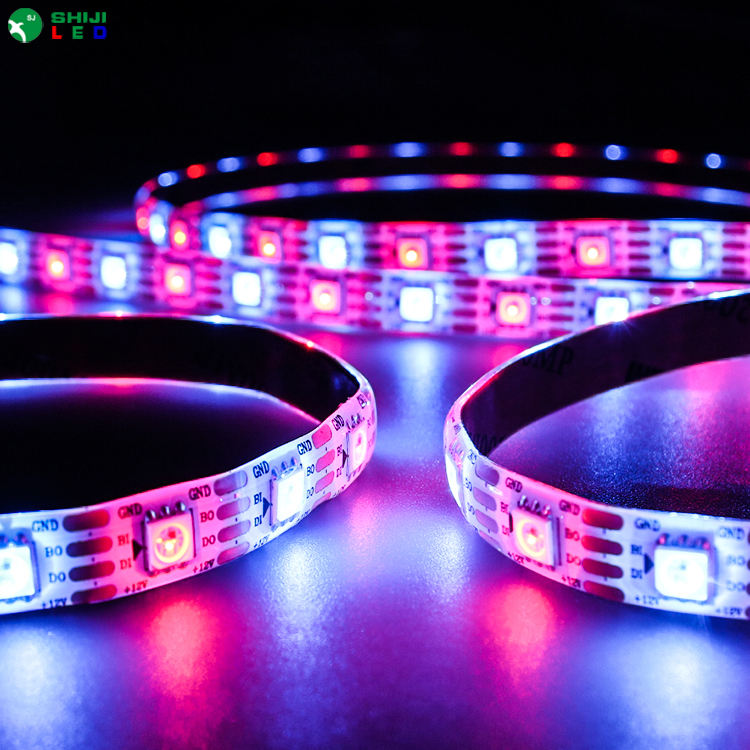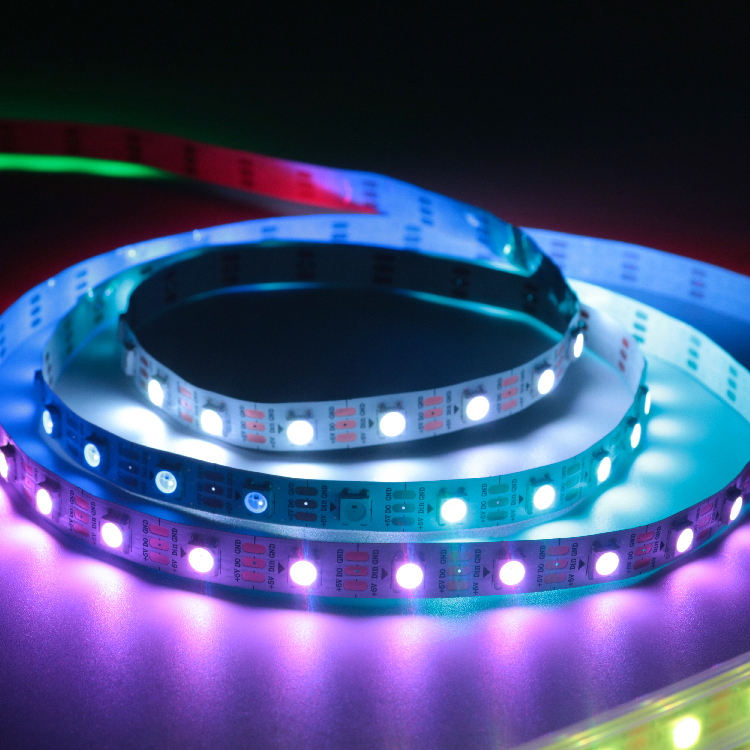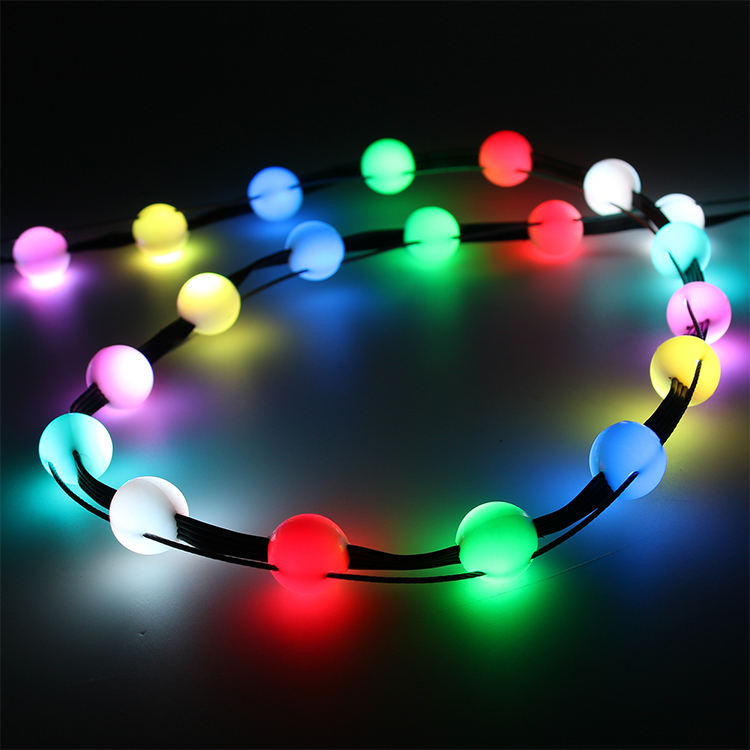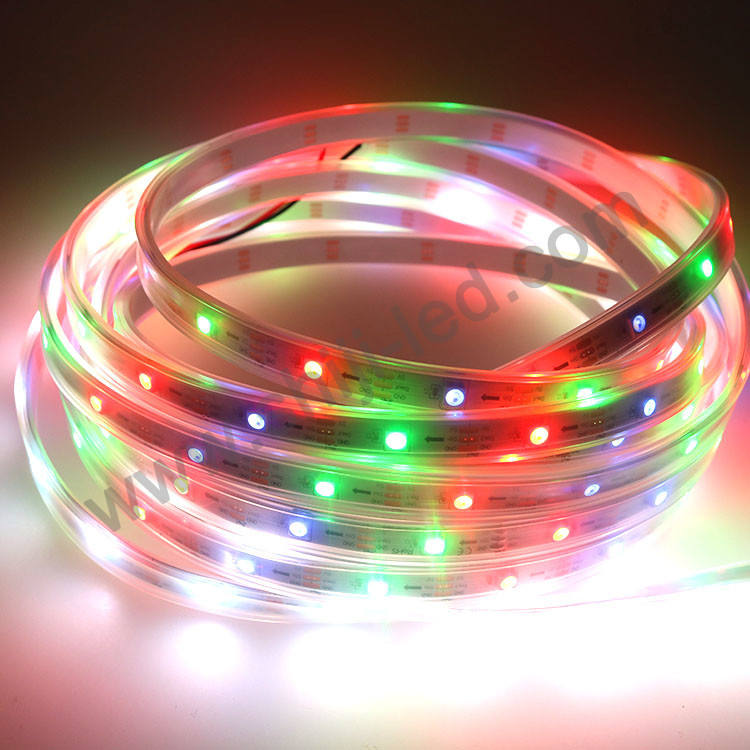What Are Programmable LED Strip Lights and How Do They Work?
Key Features That Define Programmable LED Strip Lights
Programmable LED strip lights are modern-day lighting solutions. They allow users to control each LED to create special light effects, color shifts, and brightness levels. This is made possible through in-built IC chips and digital control circuits.
Customizable Color and Brightness Control
One of the most useful aspects of programmable LED strips is that they have color and brightness change capability. Each LED is able to change its color and brightness individually. This makes for detailed animations and displays. To illustrate, the 12V GS8208 Pixel 60Leds Full Color Changing SMD5050 strip has BGR pixels that may be accessed individually. One GS8208 IC manages one LED. It supports many color-changing effects. This control suits tasks needing exact lighting setups, like building highlights or mood lighting in business spaces.
Integrated IC Chips for Dynamic Lighting Effects
The heart of programmable LED strips is their integrated circuit (IC) chips. Chips like GS8208, WS2812B, or SK6812 let each LED work on its own. For example, the GS8208 IC has two data signal pins. This means a pixel failure won’t stop signal flow unless two LEDs next to each other fail. This backup boosts reliability. It helps in complex setups.
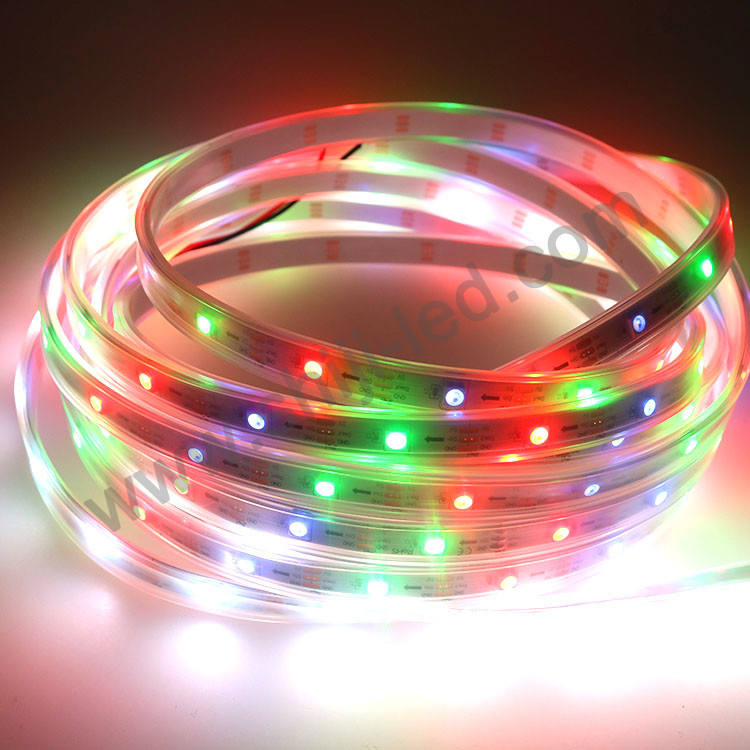
How Programmable LEDs Differ from Traditional LED Strips
Programmable LED strips stand apart from standard strips in design range and control options.
Flexibility in Design and Functionality
Standard LED strips give even light along their length. This limits them to fixed lighting. In contrast, programmable strips allow detailed lighting patterns, animations, and responsive lighting based on user or setting inputs. Each LED or pixel can be cut every 16.67mm. This offers a great fit for custom layouts.
Enhanced Control Through Software and Remote Systems
Programmable LED strips work with systems like SD card controllers, Arduino, or DMX decoders. These options include SD card controller, Arduino, DMX decoder, and more. They blend into home automation or business lighting systems. This makes them great for interactive setups or synced lighting displays.
Why Are Programmable LED Strip Lights Ideal for Energy-Efficient Lighting Solutions?
How Programmable LEDs Contribute to Lower Power Consumption
Programmable LED strip lights are built to save energy while keeping strong performance. They suit both home and business uses.
Smart Dimming and Scheduling Capabilities
These strips can dim during quiet hours or when natural light is enough. This cuts unneeded power use. Linking with sensors and timers adds efficiency. It ensures lights run only when needed.
Reduced Heat Emission Compared to Conventional Lighting
LED technology produces less heat than old-style bulbs or fluorescents. Programmable strips like the SK6812 or WS2812B use low voltages, like 5V or 12V. This keeps the heat low. The Outdoor Programmable Flexible Strip Light RGB DC5V SK6812 Addressable LED Strip runs at DC5V. It works in temperatures from -20°C to 60°C. This boosts safety and saves energy.
The Role of Programmable LEDs in Sustainable Commercial Environments
In business settings, programmable LED strips help green goals. They cut energy use and upkeep needs. Their long life and low running costs match green building standards and the company’s eco plans. Businesses can also use lively lighting to cut down on physical signs. This saves more resources.
How Easy Is It to Install Programmable LED Strip Lights in Various Settings?
Installation Requirements for Different Environments
Setting up programmable LED strips is simple. But it changes based on the setting and planned use.
Surface Types and Mounting Techniques
Non-waterproof strips have sticky backing for easy setup on clean indoor surfaces. The non-waterproof IP20 version has 3M adhesive tape on the PCB’s back. For outdoor or damp places, waterproof types come with extra mounting tools like clips and aluminum channels. The waterproof IP67 version includes an aluminum case, epoxy glue, clips, and screws.
Wiring, Controllers, and Power Supply Integration
Each setup needs proper wiring to a matching controller and power supply. Strips often have 4-pin JST SM connectors on both ends and separate power/ground wires. Matching voltage (5V or 12V) is key to avoiding harming the strip.
Comparing DIY Installation vs. Professional Setup
Tools Needed for a Seamless Installation Process
Basic tools like wire cutters, soldering kits (if custom work is needed), and a multimeter work for DIY setups. Pre-soldered connectors make it easier.
Safety Considerations During Setup
Safety steps include avoiding too much voltage. For example, don’t go over 13V for the GS8208 strip or 5V for APA102C/SK9822 strips. This can ruin the whole strip. Waterproofing must stay intact for outdoor use to stop short circuits.
How Do Programmable LED Strip Lights Compare Across Use Cases?
Comparing Residential vs. Commercial Applications
Differences in Brightness Requirements and Control Systems
Business spaces often need brighter light and advanced systems like DMX or Artnet for big sync setups. The WS2818 Digital LED strip Series works with tools like SD card controller, Artnet controller, WiFi controller, remote controller, Bluetooth controller, and more. Home users may pick simpler remote setups with medium brightness.
Design Aesthetics and Functional Priorities
In homes, it looks like mood lighting or under-cabinet glow matters most. Business uses focus on branding with lively displays or signs using pixel animation effects.
Static vs. Dynamic Lighting: Which One Suits Your Project?
Lively lighting with programmable LEDs allows moving patterns. These draw attention or build deep settings. This helps in retail or fun venues where visual punch matters.
Cost Analysis: Initial Investment vs. Long-Term Savings
Energy Bills Reduction Over Time
Programmable LED strips may cost more at first due to ICs and controllers. But their energy savings lead to big cuts in power bills over time.
Maintenance Costs Compared to Traditional Fixtures
LEDs last longer than old lights. This cuts replacement needs. Also, SHIJILIGHTING’s products come with a two-year warranty. This ensures steady work and lowers upkeep costs.
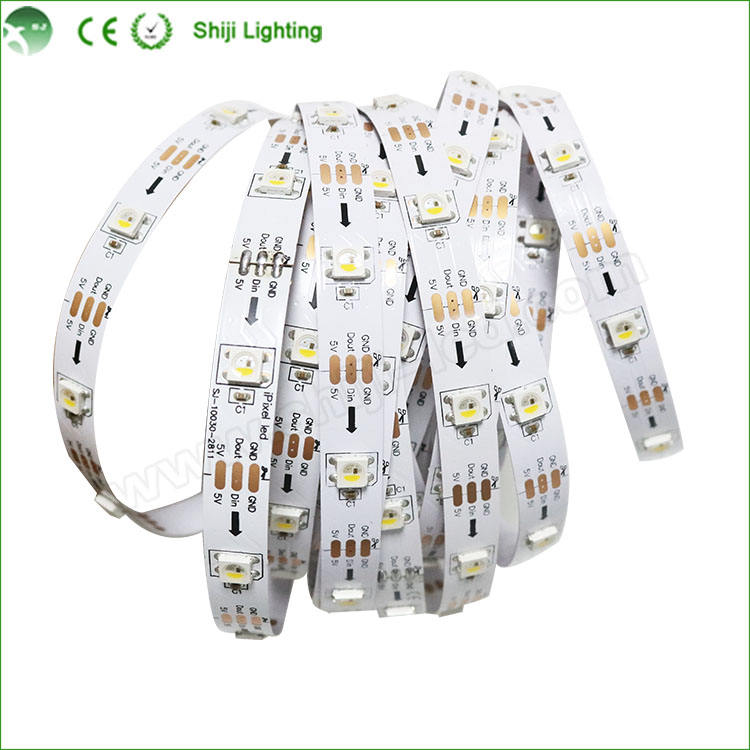
What Makes SHIJILIGHTING’s Programmable LED Strip Products Stand Out?
Our Commitment to Innovation and Product Quality at SHIJILIGHTING
At SHIJILIGHTING, we focus on new tech and top build standards across our programmable LED product lines.
Advanced IC Technology for Smooth Color Transitions
Our products use top IC chips like GS8208, SK6812, WS2812B/WS2815. These support smooth color shifts with no flicker. The WS2818 allows many color-change effects and any animation programming. It delivers vivid visuals for indoor and outdoor use.
Long Lifespan and High Lumen Output per Watt Ratio
Our addressable strips are built for efficiency. They give high lumen output per watt while keeping heat low. This suits long-term setups in tough settings.
Product Range Overview: SHIJILIGHTING’s Flagship Models
Addressable RGB Strips with WS2812B/WS2815 Chips
We offer models like the 12V GS8208 Pixel 60Leds Full Color Changing SMD5050 strip and SK6812 RGBW LED strips. These shine in lively lighting tasks.
Waterproof Options for Outdoor Commercial Use
For outdoor use, our string lights, like the Waterproof Digital Programmable String Light 5V 12V 20mm RGB LED Pixel Point Light, offer strength with IP65/IP67 ratings. These suit-building fronts or festive displays need a weather hold.
Why Businesses Choose SHIJILIGHTING for Custom Lighting Projects
Tailored Solutions for Complex Installations
We provide custom lengths and setups across all products to meet unique project needs. Customized length works across many product lines, including string lights and flexible strips.
Technical Support and After-Sales Services
Our team gives full support, from design advice to post-setup fixes. This ensures smooth blending into your space with peace of mind through our two-year warranty policy.
FAQ
Q: What features should I look for when choosing a programmable LED strip?
A: Seek individually addressable LEDs via IC chips like GS8208 or SK6812. Check compatibility with control systems, like DMX or Arduino. Look for waterproof ratings (IP65/IP67/IP68) for outdoor use. Ensure proper voltage (5V/12V) and custom options like cuttable lengths. SHIJILIGHTING offers all these across its product range.
Q: Are programmable LED strips more energy-efficient than traditional lighting?
A: Yes. Programmable LEDs use less power due to smart dimming and low heat. Models like our SK6812 RGBW run at just DC5V. They deliver high brightness with efficiency.
Q: Can I install programmable LED strips myself?
A: Yes, especially non-waterproof versions with adhesive backing. Ensure correct voltage input to avoid damage. For complex setups with many strips or outdoor use, a professional setup is best.
Q: How do static LED strips compare to programmable ones?
A: Static strips give even light but lack an effective range. Programmable strips offer lively animations ideal for branding or mood creation. SHIJILIGHTING’s addressable series supports full-color shifts controlled via software.
Q: Which brands offer reliable programmable LED strip lights?
A: SHIJILIGHTING stands out for its new-tech approach. It features advanced ICs like GS8208/WS2812B/SK6812 across flexible strips and pixel string lights. We offer waterproof options and full support with a two-year warranty.

